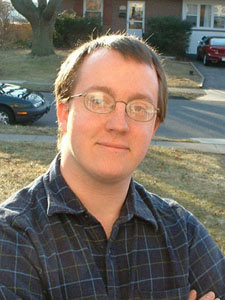 He runs a top secret research lab and also is a published science fiction writer
He runs a top secret research lab and also is a published science fiction writer
In the 10 years since my graduation, I’ve worked as a double agent. By day, I run a top secret research lab at Lockheed Martin for the U.S. government, a job for which my computer science, math, and physics studies at Lafayette prepared me. By night, however, I do what no self-respecting engineer likes to admit to: I write.
It started with John Meier, my Calculus III professor, who authored a book on the connection between creative writing and mathematics. He had us write in his math classes — a radical idea — and liked my essays enough to ask permission to include them in his book.
By my senior year at Lafayette, while I was puzzling out Computational Geometry with Professor Bjorling-Sachs, I was also taking Shakespeare and Creative Writing. I went to London for a January term with the irreplaceable Professor Lusardi, who taught me to love Shakespeare in performance and I spent my evenings writing poetry and prose. Jim Lusardi even encouraged me to submit an article to the Shakespeare Bulletin, which became my first published work.
Since then, I’ve written and published many short stories, and my first novel, a work of science fiction called Terminal Mind, just came out this year from Meadowhawk Press. Again, I can thank Lafayette for the genesis. In an Artificial Intelligence class with Professor Liew, the textbook outlined a future where people’s brains could be sliced open millimeter by millimeter, their every synapse captured in a computer, thus achieving virtual immortality. I found this unlikely — surely the experience of waking up in the dark with no body and all familiar connections severed would lead to mania or psychosis, unless . . . unless the patient was a very young child. With this idea was born the story of Terminal Mind, in which a young boy learns to cope with a whole new concept of what it means to be human.
David Walton works at Lockheed Martin’s facility in King of Prussia, Pa. He resides in Brookhaven, Pa, with his wife and their five children. Read about his fiction at www.terminalmind.com.
 He runs a top secret research lab and also is a published science fiction writer
He runs a top secret research lab and also is a published science fiction writer